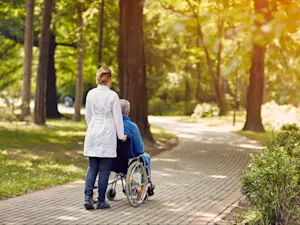
ChatGPT Found Her Cancer Just in Time — AI Gave Clues Doctors Missed
Marly Garnreiter thought her body was reacting to heartbreak — not hiding a tumor. But when her symptoms worsened, it wasn't a doctor who raised the alarm. It was ChatGPT. And the AI chatbot may have helped save her life.
The 27-year-old strategist from Paris was mourning the death of her father, who passed away from colon cancer in January 2024. When Garnreiter started experiencing night sweats and itchy skin, she blamed grief and anxiety — and so did her doctors. Initial blood tests came back normal, and her symptoms were chalked up to emotional trauma from the loss of her 58-year-old father, Victor.
But the symptoms didn't go away. They got worse.
When the Body Speaks Louder Than Emotions
As weeks turned into months, Garnreiter began noticing more alarming changes. She was eating normally but losing weight. Fatigue became constant. A tight, uncomfortable pressure developed in her chest. She couldn't shake the feeling that something wasn't right — even if her doctors insisted it was just stress.
So, in a moment of desperation, she opened ChatGPT and typed in her symptoms.
The AI response was blunt: blood cancer.
Skeptical and surrounded by friends who dismissed the suggestion, Garnreiter brushed it off. Chatbots weren't doctors, and she had already been told her labs were clear. But the symptoms kept coming, and her gut told her to keep pushing.
A Tumor Hidden in Plain Sight
By early 2025, Garnreiter's chest pain had intensified. She returned to her doctor and was referred for further testing. This time, a scan revealed a mass on her left lung. In February, a pulmonologist confirmed the diagnosis: Hodgkin lymphoma, a rare type of blood cancer that often affects people in their 20s and 30s.
Her initial symptoms — night sweats, itchy skin, weight loss, and fatigue — are common warning signs of the disease, according to the Cleveland Clinic. But they had been overlooked for months, dismissed as emotional side effects of grief.
Hodgkin lymphoma has a high survival rate when caught early. But diagnosis often requires imaging or biopsy, not just routine blood work. That gap in testing can leave patients — especially young ones with ambiguous symptoms — undiagnosed for dangerously long periods.
A Delayed Diagnosis, an Early Warning
Garnreiter now believes ChatGPT caught what human doctors missed. The chatbot's suggestion had come nearly a year before her formal diagnosis, but she hadn't acted on it. Like many, she trusted traditional medical advice — not a chatbot on the internet.
By March 2025, she had begun chemotherapy. Her treatment plan includes four to six cycles in total. Before beginning chemo, she underwent egg retrieval to preserve fertility — a precaution often taken by younger patients undergoing aggressive cancer treatment.
While the diagnosis was devastating, Garnreiter says she feels optimistic about the future. She's now encouraging others to listen closely to their bodies — even when the answers aren't obvious — stating, "It's really important to listen to our bodies ... Sometimes we tend to lose our connection with our inner self, according to PEOPLE.
What This Means for the Future of AI in Medicine
Stories like Garnreiter's are becoming more common: individuals using AI tools to research symptoms or double-check diagnoses. While ChatGPT is not certified or intended for medical use, its pattern recognition and language modeling can mimic symptom checkers — and sometimes offer surprising insight.
That raises serious ethical questions. Should AI ever be trusted for health guidance? What happens when its advice conflicts with a physician's diagnosis? And what role should tools like ChatGPT play in the future of patient advocacy?
Medical professionals caution against overreliance on AI for diagnosis, emphasizing that chatbots cannot examine a patient, run physical tests, or assess nuance. Still, Garnreiter's experience suggests that AI may have a place — not as a doctor, but as a second opinion when your intuition says something isn't right.
Her case underscores the importance of persistence, curiosity, and self-advocacy — especially when symptoms fall into gray areas that are easy to overlook.
References: Woman who linked anxiety symptoms to grief stunned after ChatGPT search led her to cancer diagnosis | ChatGPT Diagnosed a Woman with Blood Cancer a Year Before Her Doctors Found It























